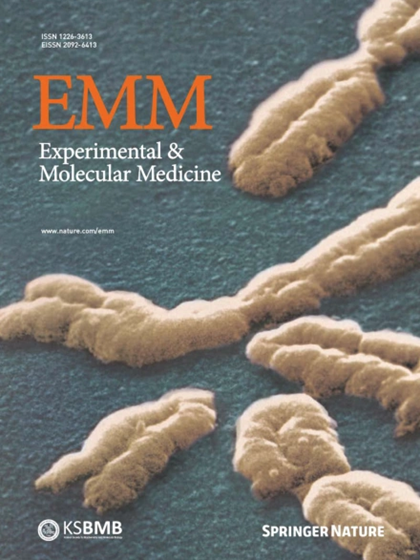高尔基缩合通过NEDD4介导的hif -1α-介导的GM130泛素化引起肠道脂质积累。
IF 9.5
2区 医学
Q1 BIOCHEMISTRY & MOLECULAR BIOLOGY
引用次数: 0
摘要
高尔基蛋白的分解破坏了脂质运输,导致脂质在小肠中积聚。然而,高尔基蛋白降解对小肠脂质运输相关高尔基结构影响的因果机制尚不清楚。在这里,我们发现高尔基体蛋白降解发生在低氧条件下的高脂肪饮食喂养的小鼠。缺氧诱导的降解促进高尔基体的结构变化,称为“高尔基缩合”。此外,缺氧诱导因子1α (HIF-1α)的激活通过高尔基基质蛋白130 (GM130)的泛素化和降解促进高尔基缩合,这是由神经前体细胞表达的发育下调蛋白4 (NEDD4)促进的。暴露于缺氧时高尔基凝结促进脂质积累,载脂蛋白A1保留和减少肠上皮乳糜微粒分泌。外源性GM130诱导可逆转肠道上皮中GM130缺失诱导的高尔基凝结和脂质积累。抑制HIF-1α或NEDD4均可防止GM130降解,从而使细胞免于高尔基凝结,从而进一步增加体内和体外载脂蛋白A1的分泌和脂质积累。此外,HIF-1α抑制剂PX-478可以阻止高尔基缩聚,从而减少脂质积累,促进高脂饮食小鼠高密度脂蛋白的分泌。总之,我们的研究结果表明,高尔基体凝聚通过HIF-1α-和nedd4介导的GM130降解在小肠脂质运输中起着关键作用,这些发现强调了预防高尔基体结构修饰可以改善肥胖个体肠道脂质积累的可能性。本文章由计算机程序翻译,如有差异,请以英文原文为准。

Golgi condensation causes intestinal lipid accumulation through HIF-1α-mediated GM130 ubiquitination by NEDD4
The breakdown of Golgi proteins disrupts lipid trafficking, leading to lipid accumulation in the small intestine. However, the causal mechanism of the effects of Golgi protein degradation on the Golgi structure related to lipid trafficking in the small intestine remains unknown. Here we find that Golgi protein degradation occurs under hypoxic conditions in high-fat-diet-fed mice. Hypoxia-induced degradation promotes structural changes in the Golgi apparatus, termed ‘Golgi condensation’. In addition, hypoxia-inducible factor 1α (HIF-1α) activation enhances Golgi condensation through the ubiquitination and degradation of Golgi matrix protein 130 (GM130), which is facilitated by neural precursor cell expressed developmentally downregulated protein 4 (NEDD4). Golgi condensation upon exposure to hypoxia promotes lipid accumulation, apolipoprotein A1 retention and decreased chylomicron secretion in the intestinal epithelium. Golgi condensation and lipid accumulation induced by GM130 depletion are reversed by exogenous GM130 induction in the intestinal epithelium. Inhibition of either HIF-1α or NEDD4 protects against GM130 degradation and, thereby, rescues cells from Golgi condensation, which further increases apolipoprotein A1 secretion and lipid accumulation both in vivo and in vitro. Furthermore, the HIF-1α inhibitor PX-478 prevents Golgi condensation, which decreases lipid accumulation and promotes high-density lipoprotein secretion in high-fat-diet-fed mice. Overall, our results suggest that Golgi condensation plays a key role in lipid trafficking in the small intestine through the HIF-1α- and NEDD4-mediated degradation of GM130, and these findings highlight the possibility that the prevention of structural modifications in the Golgi apparatus can ameliorate intestinal lipid accumulation in obese individuals. This study explores how low oxygen levels affect the Golgi apparatus, a cell structure involved in processing and packaging proteins and lipids. The study used mice and cell models to investigate these effects. They found that HIF-1α causes the Golgi apparatus to condense or shrink, which disrupts its function. This change is linked to increased lipid accumulation in the small intestine. The researchers discovered that HIF-1α plays a crucial role in this process by promoting the degradation of another protein, GM130, which is essential for maintaining Golgi structure, and NEDD4, a E3 ligase, which contributes on GM130 degradation. The findings suggest that preventing Golgi condensation by inhibiting HIF-1α could reduce lipid buildup in the obese intestine. This research provides new insights into how hypoxia affects lipid metabolism and could lead to potential treatments for obesity-related conditions. This summary was initially drafted using artificial intelligence, then revised and fact-checked by the author.
求助全文
通过发布文献求助,成功后即可免费获取论文全文。
去求助
来源期刊

Experimental and Molecular Medicine
医学-生化与分子生物学
CiteScore
19.50
自引率
0.80%
发文量
166
审稿时长
3 months
期刊介绍:
Experimental & Molecular Medicine (EMM) stands as Korea's pioneering biochemistry journal, established in 1964 and rejuvenated in 1996 as an Open Access, fully peer-reviewed international journal. Dedicated to advancing translational research and showcasing recent breakthroughs in the biomedical realm, EMM invites submissions encompassing genetic, molecular, and cellular studies of human physiology and diseases. Emphasizing the correlation between experimental and translational research and enhanced clinical benefits, the journal actively encourages contributions employing specific molecular tools. Welcoming studies that bridge basic discoveries with clinical relevance, alongside articles demonstrating clear in vivo significance and novelty, Experimental & Molecular Medicine proudly serves as an open-access, online-only repository of cutting-edge medical research.
 求助内容:
求助内容: 应助结果提醒方式:
应助结果提醒方式:


